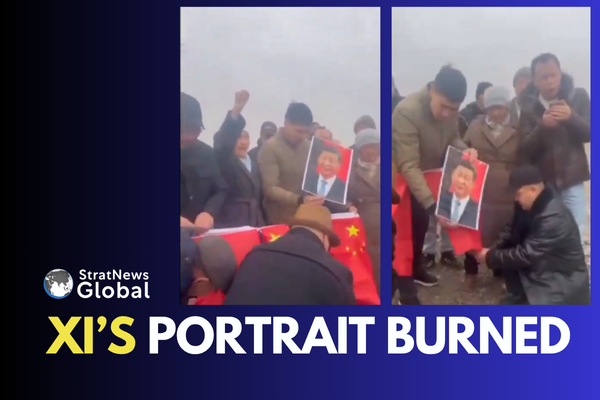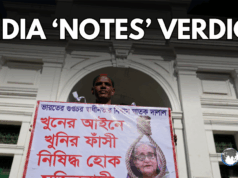Protests in Kazakhstan are rare so when a video of people burning a portrait of Chinese President Xi Jinping in Almaty went viral on the internet, it signalled public disaffection with the country’s giant eastern neighbour.
The trigger for the protests was reportedly the arrest in July, of Kazakh citizen Alimnur Turganbay by Chinese border guards in Xinjiang. He’s not been seen since and the concern is he may have ended up in one of the many detention centres for Uyghurs in Xinjiang.
Anti-China protests broke out in Kazakhstan yesterday, with Chinese flags and portraits of Xi Jinping being burned. People are angry over China’s buying up of Kazakh land and the kidnapping of Kazakh citizens by Chinese border guards. https://t.co/hwmgDmmrkB
— mariana (@yurimarine) November 16, 2025
Kazakh authorities promptly detained the flag burners and reports said some had been fined while the others had been given short jail terms of about two weeks. They were charged with committing “unlawful acts”, a phrase often used to silence even mild criticism of China. But public anger is rising and it is getting harder for the government to ignore.
His family fears torture, forced confessions. Rights organisations have long warned that China’s repression does not stop at its borders and Alimnur’s disappearance is the latest chilling example.
For many Kazakhs, China evokes other concerns. Beijing has spent years pumping billions into Central Asia, buying influence, farmland, and political quiet. Protesters say Beijing is trying to carve up Kazakh agricultural land in violation of national law, deepening the belief that economic partnerships are simply a cover for slow, steady political control.
Even as anger grows, China continues tightening its hold over Kazakhstan, announcing new projects almost every day including a $200 million cement plant in the Aktobe region. But these big deals hide serious cracks.
This week, nearly 1,500 Kazakh freight trucks were stuck at the Nur Zholy border after China processed far fewer vehicles than promised. Beijing agreed to clear at least 800 trucks a day, yet managed barely 700, choking Kazakh trade. The chaos forced Kazakhstan to cap daily entries, and the crisis became so severe that President Tokayev even sacked his transport minister over repeated border failures.
Kazakhstan’s government has usually avoided criticising China, choosing to protect investment and political stability. But the flames in the Almaty region this week reveal a clear crack in that silence. As long as Kazakh citizens continue to disappear at China’s border, anger will stay close to the surface and no number of arrests will put out a fire that Beijing itself has lit.
Research Associate at StratNewsGlobal, A keen observer of #China and Foreign Affairs. Writer, Weibo Trends, Analyst.
Twitter: @resham_sng





